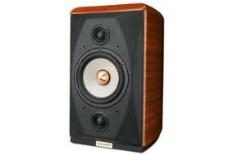What Hi-Fi? Verdict
The Callas are immensely capable, and arguably the best standmounter at this price level
Pros
- +
Expansive soundstage
- +
insight and dynamics are class leading
- +
excellent build and classy finish
- +
clever design
Cons
- -
As fussy about system quality and positioning as any other top-class standmounters
Why you can trust What Hi-Fi?
These Operas are the oddest standmounters we've seen in a while. Most monitors of this type are two-way designs with a single tweeter mated to a mid/bass unit.
That's not enough for this Italian company. In a moment of mad inspiration it probably thought: “Why use one tweeter when you can have five?” That's right, five: two at the front and three lined up on the rear panel.
The uncharitable might suspect Opera got a lot of tweeters at a good price and was finding a way of using them up. It's an easy conclusion to come to – until you listen to them.
A fresh design, but fussy mid/bass driver
A closer look at the Callas reveals a fresh design and an extremely capable but fussy mid/bass driver. The Seas-sourced mid/bass unit is part of the OEM supplier's high-end Excel range.
It's a 13cm unit with a rigid magnesium cone. The phase plug is copper and there to dissipate heat. The result is a small driver that's supremely dynamic and detailed.
The problem with any driver with such a rigid cone is that you get a bell-like resonance at higher frequencies. The hard bit for designers is stopping this from being audible without sacrificing quality and, in our experience, Opera is one of the few manufacturers to manage this trick.
They've rolled the mid/bass driver off early – at around 1.5kHz, half the frequency two-way speakers generally cross at – and used the multiple tweeters to take up the slack. A single tweeter would struggle to cope with the volume demands at 1.5kHz and still produce an extended treble.
Smart cabinet and classy leather baffle
The rest of the speaker is almost as impressive: the Callas has a very smart cabinet and a rather classy leather-covered front baffle.
Some might be surprised to find just a single pair of speaker terminals; for us it's no big deal, and at least they're good quality.
As you'd expect from any speaker at this price, these Operas require care over installation and system-matching. We got the best results with the standmount placed out into the room and angled towards the listening position.
You'll also need a solid pair of stands (we used the £400 Partington Heavis with great effect), while the partnering system is equally important – you'll need an amp able to cope with a lowish 86dB/W/m sensitivity and a 4 ohm load, and one that has enough talent to allow the Callas to shine.
Make sure the amp is decently behaved at higher frequencies – the Callas is ruthless about flaws in this region.
Get the set up right, and you're in for a treat
How does the Callas sound? First off we'd say they are easily the best Opera speakers we've ever heard.
In the past, efforts from Opera have been likeable but perhaps didn't have innate drama when music required. These are taut and mean, delivering astonishing insight and bite with the stomach-churning basslines of Nitin Sawhney's Anthem Without Nation.
That mid/bass may be a small unit, but it pounds out surprisingly chunky basslines and a truck-full of authority. The Callas also stands out for having a terrific stereo image.
The three rear-firing tweeters add spaciousness and body to the stereo sound stage that makes conventional alternatives sound two-dimensional in comparison.
Add all the Callas's more conventional strengths into the equation and you'll understand why we like them so much.
What Hi-Fi?, founded in 1976, is the world's leading independent guide to buying and owning hi-fi and home entertainment products. Our comprehensive tests help you buy the very best for your money, with our advice sections giving you step-by-step information on how to get even more from your music and movies. Everything is tested by our dedicated team of in-house reviewers in our custom-built test rooms in London, Reading and Bath. Our coveted five-star rating and Awards are recognised all over the world as the ultimate seal of approval, so you can buy with absolute confidence.


